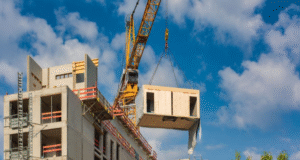In recent years, UK modular construction has gained significant traction, particularly in London, where urban development pressures, sustainability goals, and housing demands have created the perfect climate for innovation. Modular construction, which involves building components off-site in a controlled factory setting, offers faster delivery times, greater quality control, and reduced environmental impact. When combined with integrated design services in London—such as BIM, DfMA, and coordinated engineering—modular construction is proving to be a game changer for the city’s built environment.
The Evolution of UK Modular Construction
Modular construction in the UK has evolved from a niche approach to a mainstream strategy. Early modular homes were often viewed as temporary or inferior alternatives, but modern modular buildings now match or exceed traditional construction in quality, design, and durability. In 2024, the UK modular construction market was valued at approximately £15.7 billion and is projected to grow to £25 billion by 2030.
Key benefits of modular construction include up to 50 percent faster project completion, significant reductions in construction waste, and improved on-site safety. These advantages are particularly important in London, where time, space, and regulatory constraints often limit the efficiency of traditional construction methods.
Integrated Design Services in London: A Strategic Imperative
Integrated design services in London play a critical role in making modular construction viable. By synchronising architectural, structural, and MEP (mechanical, electrical, plumbing) designs early in the process, firms can reduce project risks and costs. Design for Manufacture and Assembly (DfMA) is a particularly effective approach, enabling modular components to be fabricated with precision and installed rapidly on-site.
London-based design consultancies and modular construction firms are increasingly using Building Information Modelling (BIM) and digital twin technologies to support integrated workflows. This allows for greater transparency, accuracy, and real-time collaboration among stakeholders. These integrated systems help ensure that the transition from digital design to physical product is seamless.
Key Innovations Driving Modular Adoption in London
Several trends are accelerating the growth of UK modular construction and integrated design services in London:
-
Smart Construction Technologies
Advanced tools such as AI-driven planning, digital twins, and IoT-connected sensors are improving the efficiency and performance of modular buildings. These technologies provide insights during both the design and operational phases of a building’s lifecycle. -
Net-Zero Construction Goals
With London aiming to achieve net-zero carbon by 2030, modular buildings are being designed to meet stringent environmental standards. Prefabricated components often include high-performance insulation, energy-efficient systems, and sustainable materials. -
Automated Manufacturing and Robotics
Robotic systems are increasingly used in the fabrication of modular components, resulting in more consistent quality and lower labour costs. Some firms are even experimenting with robotic assembly on-site. -
Timber and Sustainable Materials
Cross-laminated timber (CLT) is gaining popularity as a sustainable alternative to concrete and steel in modular designs. London has seen several successful timber-based modular projects, combining sustainability with aesthetic appeal. -
Retrofit and Adaptive Reuse
Modular construction is ideal for retrofitting older buildings and adapting existing spaces. This approach aligns with London’s sustainability and heritage preservation goals, offering a low-impact method of upgrading infrastructure.
Challenges and Considerations
Despite its advantages, modular construction in London faces several challenges. Transporting large volumetric units through the city can be logistically complex and costly. Additionally, planning regulations and public perception can hinder modular project approvals.
Integrated design services are essential to overcoming these hurdles. By addressing logistical and regulatory issues during the design phase, teams can develop modular solutions that meet local planning requirements while delivering high quality and performance.
Moreover, the skills gap in modular construction and digital design remains a concern. The industry must invest in training and education to ensure that professionals are equipped to manage integrated, tech-driven workflows.
Case Studies: Successful Modular Projects in London
-
Pocket Living
This developer uses modular construction to deliver affordable homes across London. By leveraging integrated design and DfMA, Pocket Living has reduced construction times by up to 30 percent while maintaining high-quality finishes. -
Nokken Cabins
A London-based startup, Nokken creates modular timber hotel cabins that can be easily assembled in remote or urban locations. Their use of sustainable materials and prefabricated designs has made them a standout in hospitality architecture. -
New Wave London Pavilion
An eco-conscious modular expansion using cross-laminated timber, this project demonstrates how integrated design can lead to both rapid deployment and environmental responsibility.
The Future of Modular Construction in London
The outlook for UK modular construction is strong, particularly in London where population growth and environmental policy demand smarter solutions. Labour’s proposed housing strategy, which aims to build 1.5 million homes in five years, positions modular construction as a key delivery mechanism.
Integrated design services will continue to evolve with advances in artificial intelligence, generative design, and robotic fabrication. As these technologies mature, modular construction will not only become faster and cheaper but also more responsive to the aesthetic and functional needs of urban life.
Conclusion
UK modular construction, supported by integrated design services London, is reshaping how the city builds. From housing to hospitality and public infrastructure, modular methods are driving efficiency, sustainability, and innovation. With the right policy support and continued investment in digital tools and workforce development, London is well-positioned to lead the modular revolution—setting an example for cities worldwide.






